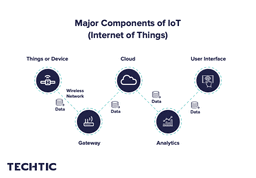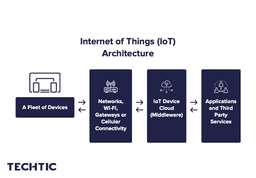10 Best Open Source IoT Frameworks of All Time
Sector: Future Tech, Technology
Author: Nisarg Mehta
Date Published: 01/19/2018

Contents
While IoT is still a buzzword to a lot of people, IoT frameworks just take the complexity up a notch. However, we’re here to simplify things. Before we dive into what some of the open-source IoT frameworks are, let’s comprehend what it means.

The open-source IoT platforms make it probable for companies and professionals to fit in and attain their significant assets within a single central location, along with workflows and design applications and envision the data.
What is an Open-Source IoT platform?
For understanding an open-source IoT platform, we will ponder on the below three realities:
- Each consumer desires to utilize any IoT device of their preference without being restricted or bound to a specific product vendor. For example, some smart devices need to be clubbed with only smartphones from the same retailer.
- All business dealers of IoT devices desire to integrate their particular devices with ease and diverse ecosystems.
- All application developers desire their apps back multiple IoT devices, which need not demand to blend the specially developed vendor-specific codes.
The open-source framework is a one-stop solution to the above constraints, and it enables scalability and superior levels of flexibility. Many open-source IoT frameworks can be downloaded for free and installed quite straightforwardly across your applications.

The fundamental components of IoT frameworks include:
1. Hardware Devices
Includes sensors, controllers, micro-controllers, and other hardware devices.
2. Software Applications
Involves written applications to configure controllers and operate them from the remote and do more.
3. Cloud and Communication Platforms
An inevitable part of IoT over which all communications happen.
4. Cloud Applications
Written applications that bind local hardware devices and cloud-based devices.
Top 10 Open Source IoT Frameworks:
Many business organizations try and tested some out-of-the-box open-source platforms when they find the best IoT tools that can provide robust analytics and interoperability between their connected devices. Let’s get a brief overview of the 10 most deployed open source IoT frameworks to see if they meet your business needs.
1. KAA IoT
Kaa IoT cloud platformis one the most efficient and rich open-source Internet of Things cloud platforms where anyone has a free way to materialize their smart product concepts. On this platform, you can manage an unlimited number of connected devices with cross-device interoperability. You can achieve real-time device monitoring with the possibility of remote device provisioning and configuration. It is one of the most flexible IoT platforms for your business which is fast, scalable, and modern.
2. MACCHINA.io
macchina.io IoTplatforms provide a web-enabled, modular, and extensible JavaScript and C++ runtime environment for developing IoT gateway applications. It also supports a wide variety of sensors and connection technologies including Tinkerforge, bricklets, Xbee, and many others including accelerometers. This platform is able to develop and deploy device software for automotive telematics and V2X, building and home automation, industrial edge computing and IoT gateways, smart sensors, or energy management systems.
3. ZETTA
Zettais a server-oriented platform that has been built aroundNodeJS,REST, and a flow-basedreactive programming developmentphilosophy linked with the Siren hypermedia APIs. They are connected with cloud services after being abstracted as REST APIs. People believe that theNode.js platformis best to develop IoT frameworks. These cloud services include visualization tools and support for machine analytics tools like Splunk. It creates a zero-distributed network by connecting endpoints such as Linux and Arduino hacker boards with platforms such as Heroku.
4. GE PREDIX
GE’s platformas a service software for industrial IoT is based on the concept of cloud foundry. It adds asset management, data collection, device security, and real-time, predictive analytics that also supports heterogeneous data acquisition, access, and storage. GE predix was developed by GE for its own operations and consequently has become one of the most successful of the enterprise IoT platforms and with the recent partnering of GE and HPE, the future looks even better.
5. ThingSpeak
ThingSpeakis another IoT platform that lets you analyze and visualize the data in MATLAB and eliminates the need to buy a license for the same. It helps you to collect and store sensor data in private channels while giving you the freedom to share them in public channels. It works with Arduino, particle photon and electron, and many more applications. It is used mostly for sensor logging, location tracking, and alerts and analysis. It also has a worldwide community which is quite helpful in itself.
6. DeviceHive
DeviceHive is yet another feature-rich open-source IoT platform that is currently distributed under the Apache 2.0 license and is free to use and change. It provides Docker and Kubernetes deployment options and can be downloaded and use with both public and private cloud. It allows you to run batch analytics and machine learning on top of your device data and more. Various libraries, including Android and iOS libraries, are supported in DeviceHive.
7. Distributed Services Architecture
DSAis an open-source IoT that unifies the separate devices, services, and applications in the structured and real-time data model and facilitates decentralized device inter-communication, logic, and applications. Distributed service links are a community library that allows protocol translation and data integration to and from 3rd part data sources. All these modules are lightweight making them more flexible in use. It implements DSA query DSL and has inbuilt hardware integration support.
8. Eclipse
Eclipse IoT platformis built around the java/OSGi-based Kura API container and aggregation platform for M2M applications running on service gateways. Kura is an open-source framework based on Eurotech’s everywhere cloud IoT framework and is often integrated with the Apache Camel. Some of its major sub-projects include the PAho messaging protocol framework and the Eclipse SmartHome framework.
9. Open Connectivity Foundation
Open Connectivity Foundationplatform is an amalgamation of the intel and Samsung backed open interconnect consortium organization and the UPnP forum which is working hard to become the leading open-source standard group for IoT and its OCF IoTivity depends on RESTful, JSON and CoAp. OIC was created in July 2014. The first version of OCF 1.0 was released in September 2015 for the core framework, smart home device, resource type, security, and remote access capabilities.
10. OpenHAB
OpenHAB IoT frameworkis capable of running on any device that is capable of running a JVM. All the IoT technologies are abstracted by the modular stack into “items”, and offer rules, scripts, and supports for persistence—the ability to retain device states for a period of time. It offers a variety ofweb-based UIsand is supported by major Linux hacker boards. It is deployed on-premise and connects to devices and services from different vendors.
No. | IoT Platform | Services | Device Management Platform | Price |
1 | KAA IoT | Supports Various Hardware Types, Device Management, Reliably Collect Data, Configuration Management, Support Various Integrations, Command Execution, Connect Devices directly or via Gateways | Yes | KAA CLOUD 5 Free Up to 5 devices For personal use |
2 | MACCHINA.io | Secure Web Access To IoT Devices From Anywhere, Remote Control Of IoT Devices With Apps and Voice Assistants, Secure Remote Management via Shell and Desktop (VNC & RDP). | Yes | macchina.io Remote Manager Free Up to 5 devices |
3 | ZETTA | Run Everywhere, API Every Thing, Support almost all Device Protocols. | No | Open Source, Free |
4 | GE PREDIX | Providing expertise, support, and training to maximize your IIoT software | Yes | As per Customer Needs |
5 | ThingSpeak | Send data to ThingSpeak from your devices, create instant visualization of live data with MATLAB, and send alerts. | Yes (With MATLAB) | As per Customer Requirement |
6 | DeviceHive | Provide End-to-End Solutions, Consulting and Commercial Support, Device Enablement, etc. | No | Open Source, Free |
7 | DSA (Distributed Services Architecture) | Provides an open-source Apache 2.0 licensed implementation of a DSBroker written in Dart. | No | Open Source, Free |
Choose the Right Open Source IoT App Development Framework
So, these were the top 10 open-source IoT frameworks. By now, we are sure you have a clear understanding of what IoT frameworks are, the different frameworks available in the market, their pros and cons, and their IoT applications to projects. If these feel daunting to you, we recommendgetting in touch with uswho is a top-notch IoT app developmentcompany.
We are a specialist IoT services provider, have been working on a few IoT platforms, and have set up a completely new, highly motivatedteam of IoT engineers who passionately want to be part of the next-generation technology! Feel free to share your inputs about this article in the comments section.
Latest Tech Insights!
Join our newsletter for the latest updates, tips, and trends.



